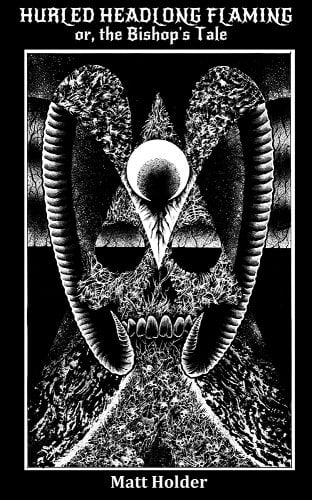
Matthew Holder is joining us today to talk about his novel, Hurled Headlong Flaming Here’s the publisher’s description:
Hurled Headlong Flaming: or, The Bishop’s Tale is a dark fantasy novella by Matt Holder that follows a priest on a perilous quest to a hellish underworld to retrieve an ancient manuscript he believes can help prevent the apocalypse. Drawing from influences like Dante, Milton, and Robert E. Howard, and Lovecraftian dream-quest literature, this bizarre tale sees the Bishop descend through a hidden city, forced to engage in infernal dialogues and navigate labyrinthine streets while pursued by demonic creatures. Grappling with questions of faith, truth, and the brutality of the Crusades, the Bishop’s harrowing journey examines the violence that often accompanies meaning-making in a world that resists interpretation.
What’s Matthew’s favorite bit?

But God said to me, ‘You may not build a house for my name, for you are a man of war and have shed blood.’
According to 1 Chronicles 28:3, God says these words to David, the warrior king of the Israel nation, after he asked permission to build a temple to house the Ark of the Covenant and serve as God’s “footstool” amongst the people. It falls to Solomon, then, David’s son, to build the temple, existing within the peace that David’s warring bought. Throughout David’s conquest, it’s clear from the text that he carried the full weight and support of God as David worked to establish Israel as a nation-state (mostly – there were some missteps), yet whether sanctioned by God or not, it seems that war, that shedding blood, carried a mark of profanity, even for a man after God’s own heart. This juxtaposition—between God-sanctioned war and the irrevocable mark of shedding blood—has stuck with me for a long time, informing my own academic interests in violence and its representation and my personal convictions related to faith and violence. In my novella Hurled Headlong Flaming: or, The Bishop’s Tale, I’d have to say that the tensions between these elements are my favorite bits: faith, violence, and world-making.
The novella is set at the eve of the fall of Acre in 1291, a historical flashpoint that symbolically served as a kind of closure to the previous centuries of European crusading. Our main character is a Catholic Bishop, dispatched to an infernal netherworld in the hopes of retrieving knowledge that might help better prepare humanity for the coming revelation. That’s the plot, more or less, but what most excited me about the book and its writing was being able to tap into the affordances of pulp storytelling (in this case, the major touchstone is sword and sorcery) as means to investigate or think through issues related to violence, to its representation, to its relationship to power, to truth, to identity.
Of course none of this is new territory, but it’s what gets me excited as a reader, as a writer, as a teacher: what kind of matter does violence bring into the world? What is its epistemology? What marks does it bear on its victims and its perpetrators? I turned to the genre of sword and sorcery to help explore these questions for a few reasons: 1) because its creator, Robert E. Howard, was also invested in notions of power and violence; 2) because the stylistic tendencies of sword and sorcery (a propulsive pace delivered through vivid action and terse world building, among other things) challenged me to think about my character as fully embodied and active; and 3) because I wanted to attempt an Epic Scale with Big Philosophical Ideas in a short space, and sword and sorcery provides that template.
But lest anyone think Hurled Headlong Flaming is 100 pages of only swords and blood, I also wanted to allow for moments of greater introspection and, quite literally, philosophical dialogues. I chose for my protagonist a learned person, someone who would have read Plato and Aristotle and Augustine and Scripture, someone whose faith is truly genuine and can engage, attend, and question his own ideologies. The Bishop wrestles with the same debates that we have today about violence and the stranglehold it wields over those who seek power, who seek to, in ways great or small, change the world. Is it ever worth it? Or, perhaps, what is its worth, if any? These questions haunt the Bishop in the same way that they haunt me, that they likely haunt most of the world watching violent catastrophe after violent catastrophe pile up around them; we collectively grasp for meaning through it all, terrified that either: a) there is no meaning; or b) that it means everything. Or who knows, perhaps a third option, or a fourth. Nothing is ever so clean or dichotomous. This novella is my attempt to cathartically interrogate violence, and it’s my favorite bit.
LINKS:
Social Media Links
Twitter: @mattholder93Blue Sky: @mattholder93.bsky.social
Publisher Website: https://spiraltowerpress.blogspot.com/
Book Links
BIO:
Matt Holder teaches in the St. Louis area and holds a PhD in English literature. His academic writing can be found at Disability Studies Quarterly and ImageTexT, his reviews at Strange Horizons, and he has published fiction with Old Moon Quarterly. Matt lives in Fenton, MO, with his wife, Maggie, and their dog, Lily.
